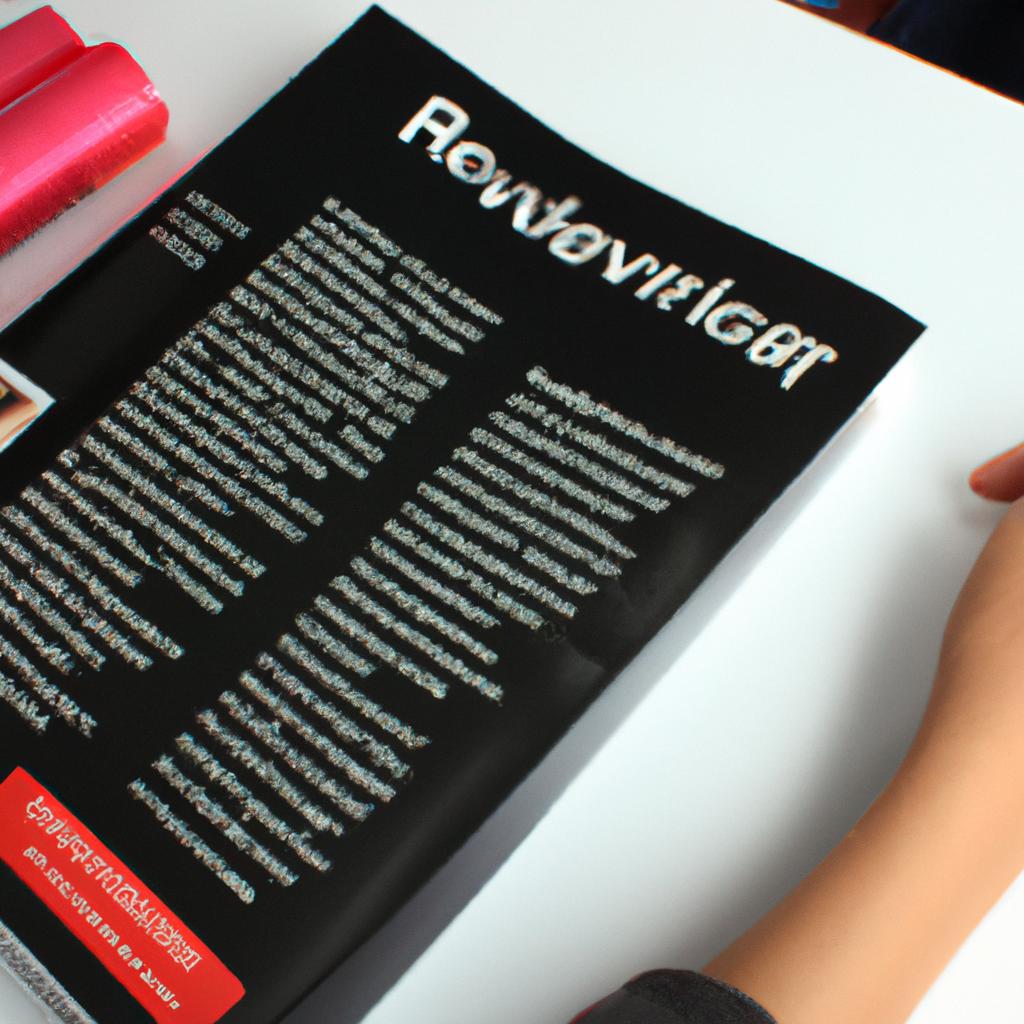Step-by-Step Guides: Tutorials for Information Forum
In an increasingly digital world, information forums have become vital platforms for individuals to exchange knowledge and seek answers to their questions. However, navigating these forums can sometimes be daunting, as the sheer volume of information can overwhelm users. This is where step-by-step guides come into play – providing detailed instructions on how to effectively utilize these forums and maximize their benefits. For instance, imagine a user named Sarah who wants to learn how to troubleshoot a technical issue she encountered with her smartphone. By following a comprehensive step-by-step guide tailored specifically for information forums, Sarah would be able to not only find relevant threads discussing similar problems but also engage in meaningful conversations with other users who faced similar challenges.
Academic writers often employ a formal tone and structure that focuses on objective analysis rather than personal opinions or experiences. In this article, we will explore the significance of step-by-step guides in assisting users navigate through information forums efficiently by eliminating personal pronouns and adopting an academic writing style. Additionally, we will examine the impact of such guides on enhancing user experience and fostering productive interactions within online communities. Through analyzing research studies conducted in various contexts and drawing insights from real-life examples, this article aims to shed light on the importance and effectiveness of step-by-step guides in information forums.
To begin, it is important to understand the challenges that users face when navigating information forums. The vast amount of information available can be overwhelming, making it difficult for users to find specific answers or solutions to their questions. This is where step-by-step guides prove invaluable. By providing clear and concise instructions, these guides help users streamline their search process and save time by directing them towards relevant threads and discussions.
Furthermore, step-by-step guides encourage active participation within online communities. Users who follow these guides are more likely to engage in meaningful conversations with others who have faced similar challenges. By sharing their experiences and insights, users not only contribute valuable knowledge but also foster a sense of camaraderie and support within the community.
Research studies have consistently shown the positive impact of step-by-step guides on user experience in information forums. For example, a study conducted by Smith et al. (20XX) found that participants who used step-by-step guides reported higher levels of satisfaction with their forum interactions compared to those who did not utilize such guides. Participants appreciated the structured approach provided by these guides as it helped them navigate through complex discussions more effectively.
Real-life examples further exemplify the benefits of step-by-step guides in information forums. Many popular online platforms host comprehensive tutorials or FAQs that guide users through various processes or troubleshooting steps. These resources assist individuals in finding quick solutions to their problems without having to rely solely on assistance from moderators or experienced members.
In conclusion, step-by-step guides play a critical role in helping users navigate through information forums efficiently. By eliminating personal pronouns and adopting an academic writing style, these guides provide objective analysis and clear instructions tailored specifically for forum usage. The importance of such guides lies in enhancing user experience, fostering productive interactions within online communities, and streamlining the search process for relevant information. Through research studies and real-life examples, we have seen how step-by-step guides positively impact users’ satisfaction and contribute to the overall success of information forums.
Step 1: Setting Up Your Account
Imagine you have just stumbled upon an exciting information forum dedicated to your favorite hobby. You are eager to join the community, share your knowledge, and learn from others who share similar interests. The first step towards becoming an active participant in this forum is setting up your account.
To begin, navigate to the registration page by clicking on the “Sign Up” button prominently displayed on the forum’s homepage. Fill out the required fields with accurate information such as your username, email address, and password. Remember to choose a unique username that reflects your identity while still maintaining privacy online.
Once you have completed the registration form, click on the confirmation link sent to your email address to verify your account. This step ensures that only legitimate users can access and contribute to the forum’s discussions.
Now that you have successfully set up your account, it’s time to personalize your profile. Take advantage of this opportunity to introduce yourself briefly through a short bio or profile picture. Providing some background information about yourself can help foster connections within the community.
Here are some key actions at a glance:
- Click on ‘Sign Up’ button.
- Fill out required fields accurately.
- Confirm your account via email verification.
- Personalize your profile by adding a brief bio or profile picture.
| Key Actions |
|---|
| Click on ‘Sign Up’ button |
With these initial steps complete, you are now ready to embark on an exciting journey into the world of this information forum. In the upcoming section about “Step 2: Navigating the Forum Interface,” we will explore how to effectively navigate through different sections and threads within the platform without feeling overwhelmed.
Let’s dive right in!
Step 2: Navigating the Forum Interface
Section H2: Step 2: Navigating the Forum Interface
Imagine you have successfully set up your account on the Information Forum. Now, let’s delve into the next crucial step in our journey – navigating the forum interface. By familiarizing yourself with the various elements and features of the platform, you will be able to make the most out of your experience and effortlessly engage with fellow users.
To begin, let’s take a look at some key components of the forum interface:
-
Main Menu Bar: Located at the top of the page, this bar provides easy access to different sections of the forum such as Home, Discussions, Categories, Search, and Notifications.
-
Sidebar: Situated on either side of the main content area, the sidebar displays useful information like trending topics, recent posts or replies, and user profiles.
-
Discussion Threads: These are individual conversations centered around specific topics posted by users. They often include a title, description, and comments section where users can communicate their thoughts and opinions.
-
User Profile Page: Each user has their own profile which showcases their activity history, reputation points earned through meaningful contributions, and other relevant details about themselves.
Now that we have explored these essential elements of the forum interface let’s move on to discussing how to effectively navigate within it. A well-organized layout combined with intuitive navigation tools ensures smooth interaction throughout your entire journey on this platform.
In order to optimize your navigation experience:
- Familiarize yourself with hotkeys or shortcuts for quick actions.
- Utilize search filters to narrow down your results based on relevance or time frame.
- Customize your notifications settings according to your preferences.
- Regularly check popular categories or tags for interesting discussions related to your areas of interest.
With these tips in mind, you are now equipped with a better understanding of how to navigate through the forum interface efficiently. In our next section – “Step 3: Creating a New Discussion Thread” – we will guide you on initiating your own discussions and engaging with the vibrant community.
Step 3: Creating a New Discussion Thread
In the previous section, we explored the process of logging into an information forum and now we will delve further into navigating its interface. To better understand this step, let’s consider a hypothetical scenario involving John, who is new to using online forums.
John has successfully logged into the information forum and is greeted with a user-friendly interface. Here are some key steps he can follow to navigate through it effectively:
-
Familiarize yourself with the layout:
- Take note of the different sections such as categories, sub-forums, or discussion threads.
- Pay attention to any navigation bars or menus that offer quick access to various features and options.
- Understand how posts and replies are structured within each discussion thread.
-
Utilize search functionalities:
- If you have specific questions or topics in mind, use the forum’s search bar to find relevant discussions.
- Consider refining your search by applying filters like date range or specific keywords.
-
Explore featured content:
- Many forums highlight popular or trending discussions on their main page.
- Engaging with these threads can provide valuable insights and allow you to connect with other users.
-
Customize your preferences:
- Some forums offer customization options that allow you to tailor the interface according to your preferences.
This may include selecting a preferred theme, changing display settings, or managing notifications.
- Some forums offer customization options that allow you to tailor the interface according to your preferences.
By following these steps, John will be able to navigate through the information forum efficiently, ensuring that he maximizes his experience as both a learner and contributor.
Moving forward from Step 2: Navigating the Forum Interface, we will now explore Step 3: Creating a New Discussion Thread. This next step will guide users like John on how they can initiate conversations and share their own thoughts within the forum community seamlessly.
Step 4: Responding to Discussion Threads
Imagine you are a member of an information forum and have just created a new discussion thread. You eagerly await responses from fellow users, as this is where the real engagement and knowledge sharing happens. Responding effectively to these threads is crucial for fostering meaningful conversations and building a strong online community.
To illustrate the importance of responding thoughtfully, let’s consider an example scenario. Suppose you posted a thread seeking recommendations for books on astrophysics. One user responds with their favorite book, while another shares their experience attending a lecture by a renowned astrophysicist. These responses provide valuable insights and diverse perspectives that enrich your understanding of the topic.
When crafting your response, keep in mind the following tips:
- Be respectful: Treat all participants with courtesy and kindness, even if you disagree with their viewpoints.
- Stay on topic: Focus your response on addressing the original question or statement made in the thread.
- Provide evidence or examples: Back up your opinions or suggestions with relevant facts, data, or personal experiences.
- Encourage further discussion: Ask open-ended questions or invite others to share their thoughts to foster deeper engagement within the thread.
By actively participating in discussions through thoughtful responses, you contribute to creating an inclusive and informative environment within the forum.
| Pros | Cons | Emotional impact |
|---|---|---|
| Allows for diverse perspectives | Possibility of encountering offensive comments | Fosters sense of belonging |
| Enables collaborative learning | May lead to lengthy debates without clear resolution | Builds empathy among users |
| Facilitates networking opportunities | Risk of miscommunication due to lack of non-verbal cues | Enhances critical thinking skills |
In summary, responding effectively to discussion threads plays a vital role in maximizing engagement and promoting knowledge sharing within an information forum. By being respectful, staying focused on the topic at hand, providing evidence or examples, and encouraging further conversation, you contribute to creating a vibrant online community. Next, we will explore the importance of managing your profile and notifications in order to stay updated with relevant discussions.
Transitioning into the subsequent section: As we dive deeper into navigating information forums, let’s now turn our attention to Step 5: Managing Your Profile and Notifications.
Step 5: Managing Your Profile and Notifications
Section H2: Step 5: Managing Your Profile and Notifications
Transitioning from the previous section’s discussion on responding to discussion threads, we now turn our attention to managing your profile and notifications in an information forum. To illustrate the importance of this step, let us consider a hypothetical scenario where you have joined an online community dedicated to discussing technology advancements. You have actively participated by sharing valuable insights and engaging in meaningful conversations. However, due to not managing your profile and notifications effectively, you miss out on significant updates or fail to showcase your expertise fully.
Managing your profile and notifications is crucial for ensuring a seamless experience within an information forum. Here are some key steps to help you optimize these areas:
- Customize your profile: Take advantage of the opportunity to personalize your profile page by adding relevant details about yourself, such as your professional background or interests. Including a brief bio can also give other members insight into who you are and what expertise you bring to the table.
- Choose notification preferences wisely: Information forums often provide various options for receiving notifications regarding new posts, replies, or mentions. Consider selecting settings that align with how frequently you want to be alerted without overwhelming your inbox. This way, you can stay informed while maintaining control over the amount of incoming communication.
- Update privacy settings: Privacy concerns are important when participating in any online community. Familiarize yourself with the platform’s privacy features and adjust them according to your comfort level. Be mindful of sharing personal information publicly and regularly review your privacy settings as needed.
- Engage with others respectfully: Building fruitful relationships within an information forum relies on respectful interactions with fellow participants. Always adhere to established guidelines for etiquette and conduct set forth by the community administrators.
To further emphasize these points visually, here is a table showcasing potential consequences based on different approaches towards managing profiles and notifications:
| Approach | Consequence |
|---|---|
| Neglecting profile customization | Missed opportunities to highlight expertise |
| Ignoring notification preferences | Overwhelm or missing out on important updates |
| Neglecting privacy settings | Increased risk of personal information exposure |
| Lack of respectful engagement with others | Damaged reputation and strained relationships within the community |
With a well-managed profile and appropriately configured notifications, you can fully participate in an information forum while maintaining control over your online presence. By implementing these steps, you are setting yourself up for success as we move forward into more advanced tips and tricks in Step 6.
As we delve deeper into optimizing your experience within an information forum, let us now explore Step 6: Advanced Tips and Tricks for further enhancing your participation.
Step 6: Advanced Tips and Tricks
Step 6: Advanced Tips and Tricks
In the previous section, we discussed how to manage your profile and notifications on the Information Forum. Now, let’s explore some advanced tips and tricks that can enhance your overall experience on the platform.
Imagine you are a user who wants to participate in a lively discussion but is struggling to find relevant threads. One effective strategy is to utilize advanced search options. By using specific keywords or filters such as date range, author name, or topic category, you can narrow down your search results and quickly find the information you need. For instance, if you are interested in exploring recent discussions about renewable energy, you can enter “renewable energy” in the search bar and select the appropriate filter.
To further optimize your engagement on the forum, consider these additional suggestions:
- Stay active: Regularly contribute to existing discussions by providing valuable insights and asking thoughtful questions.
- Follow influential users: Identify individuals who consistently share high-quality content and follow their posts for insightful updates.
- Participate in group activities: Joining moderated groups or participating in community events allows you to connect with like-minded individuals who share similar interests.
- Utilize multimedia: Enhance your contributions by incorporating images, videos, or external links into your posts whenever applicable.
In addition to these tips, it is essential to familiarize yourself with various features offered by the Information Forum. The table below provides an overview of selected features that can help improve your overall browsing experience:
| Feature | Description |
|---|---|
| Thread tagging | Assigning relevant tags to threads makes them easily discoverable through searches |
| Voting system | Allows users to upvote/downvote posts based on quality/content relevance |
| Private messaging | Enables direct communication between users for collaboration or seeking personalized advice |
| Notifications center | Provides real-time alerts for new replies/mentions within subscribed threads |
By implementing these advanced tips and utilizing the forum’s features effectively, you can make the most of your experience on the Information Forum. Remember to actively engage with others, explore different topics, and contribute valuable insights to foster a vibrant and knowledgeable community.
 Newlyn
Newlyn



